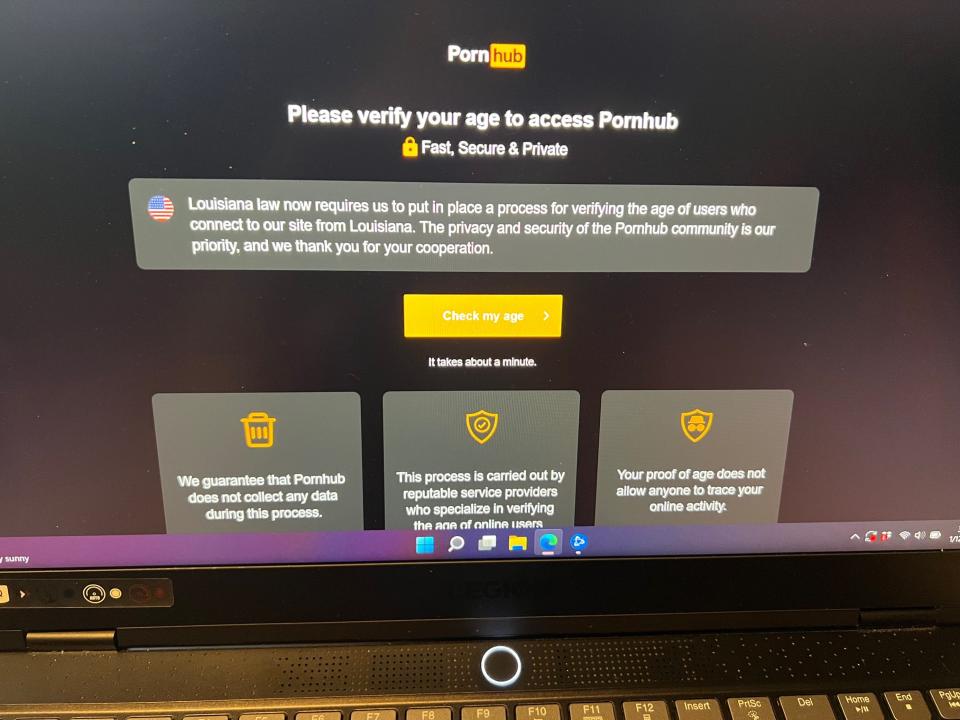Louisiana House committee advances bill to punish porn sites that don’t verify user’s age
- Oops!Something went wrong.Please try again later.
A Louisiana legislative committee advanced a bill Wednesday that would let the state attorney general pursue civil penalties against companies that do not comply with a law that requires pornography websites to verify the age of its users.
The House Committee on Commerce voted 15-1 to advance House Bill 77, sponsored by Rep. Laurie Schlegel, R-Metairie. Rep. Candance Newell, D-New Orleans, was the sole vote in opposition.
Schlegel, a sex addiction therapist, said she filed the bill to ensure enforcement of the existing law to better protect minors, who she views as susceptible to harm from pornography.
Newell said the bill’s language is overly broad and might give the attorney general room for personal interpretation.

“I just want to make sure that this can be used with any attorney general because, as we know, we’re getting a new one next year, and we want to make sure that you have the proper guidelines in place, so that what is deemed as inappropriate doesn’t change from administration to administration,” Newell said.
Schlegel pushed back on the idea that the language is overly broad, pointing to portions of her bill that incorporate the Miller Test, the primary tool used to gauge what is obscenity.
The Miller Test has three parts:
Would the average person applying contemporary community standards find the work, taken as a whole, is excessively sexual in nature?,
Does the work depict or describe, in a patently offensive way, sexual conduct specifically defined by the applicable state law?
Does the work, taken as a whole, lack serious literary, artistic, political or scientific value?
Nearly identical language appears in Schlegel’s proposal.
Despite Schlegel’s steps to incorporate these standards, free speech advocates are concerned the bill would chill constitutionally protected speech.
Chris Kaiser, advocacy director of the Louisiana ACLU, said his primary worry is that the bill builds on a law that went into effect earlier this year that requires pornography websites to verify the ages of its users. The law, which Schlegel also authored by, requires websites with at least one-third “material harmful to minors” use certain age verification measures.
Want to access online porn in Louisiana? Be ready to hand over your LA Wallet
Several major pornography websites have opted to require Louisiana users to log in to their websites with LA Wallet, a cell phone application that can carry a state-issued identification card.
Lobbyists representing LA Wallet, a private company contracted by the state, filled out cards in support of the bill.
“The First Amendment protects adults’ right to access protected speech, including pornography, in the privacy of their own homes,” Kaiser said. “By requiring adults to provide age verification to that, it’s burdening their fundamental rights to free speech.”
Kaiser also said the penalties laid out in Schlegel’s new proposal, which allow for an up to $5,000 per day fine for companies that violate the law, further stifle protected speech.
Several progressive organizations oppose the bill, including 10,000 Women Louisiana.
Digital porn and privacy at center of debate over new Louisiana Law
Melissa Flournoy, founder of 10,000 Women Louisiana, questioned the need for Schlegel’s proposal.
“What purpose will this accomplish other than generating a reason for the attorney general’s office to pursue efforts of additional fines and fees?” Flournoy asked the committee. “Is this bill part of a larger strategy to promote censorship and limit access to publicly available information, including R-rated movies shown on cable TV and streaming services?”
Flournoy asked legislators to amend the bill to include language that makes it clear sex education or other health-related information would not be targeted.
Rep. Edmond Jordan, D-Baton Rouge, pushed back on the amendment, pointing to provisions in the Miller Test that exempt material with scientific value from the definition of obscenity.
Jordan did mention language in the bill that defines material harmful to minors differs from Schlegel’s 2022 proposal, which he said could lead to inconsistencies in the statute.
Schlegel said she was open to amending her bill on the House floor to address this.
— The Louisiana Illuminator is an independent, nonprofit, nonpartisan news organization driven by its mission to cast light on how decisions are made in Baton Rouge and how they affect the lives of everyday Louisianians, particularly those who are poor or otherwise marginalized.
This article originally appeared on Shreveport Times: Louisiana House advances bill to punish sites that violate state's porn law

